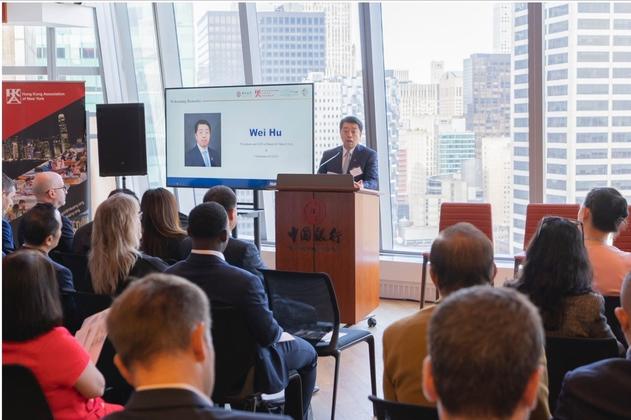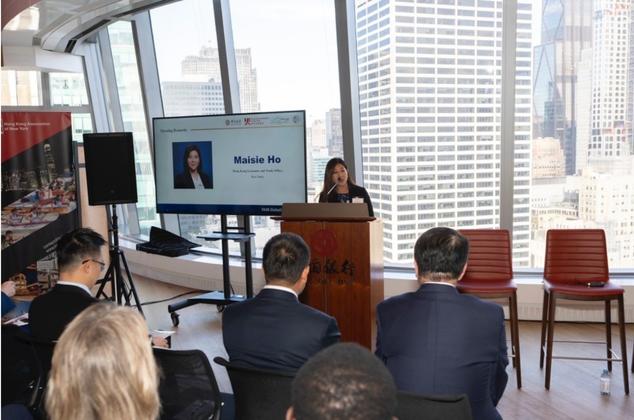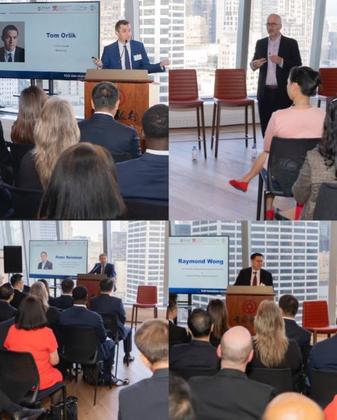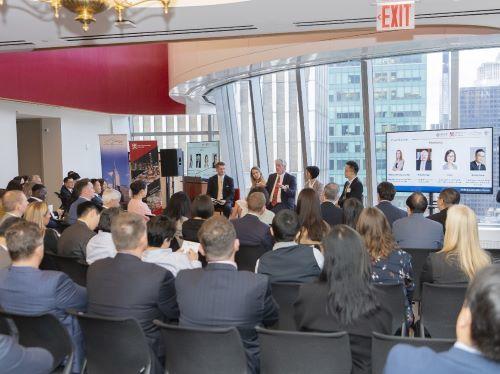Bank of China U.S.A. proudly hosted the RMB Globalization Forum in partnership with the Hong Kong Association of New York
NewsOn Monday, Bank of China U.S.A. proudly hosted the RMB Globalization Forum in partnership with the Hong Kong Association of New York (HKANY) and the China General Chamber of Commerce USA (CGCC USA). This pivotal event focused on enhancing U.S.-China business ties and brought together distinguished experts in commerce, financial markets, and economics to discuss the internationalization of the Chinese currency, the Renminbi (RMB), and its growing significance in the global markets.
The forum commenced with introductory remarks from Mr. Wei Hu, President and CEO of Bank of China U.S.A., who emphasized China’s expanding role on the global stage, particularly in the financial sector and highlighted the increasing utilization of RMB in international trade. “As more global suppliers, manufacturers, and partners adopt the RMB, businesses can avoid the added layer of currency conversions, streamlining their supply chains and increasing profitability,” remarked Mr. Hu. RMB, now the 4th most frequently used currency in global payments, is having an increasingly prominent role in forex reserves, an evolution that “promotes greater financial stability and reflects the interconnectedness of our economies” according to Mr. Hu.

Maisie Ho, Head of the Hong Kong Economic and Trade Office in New York, provided an insightful perspective on Hong Kong’s critical role in facilitating the globalization of RMB. She elaborated on the territory’s unique position as a bridge between mainland China and the global economy, thanks to its adherence to the “One Country, Two Systems” policy. Ms. Ho explained that Hong Kong’s legal and regulatory framework, grounded in common law, plays an essential role in supporting multilateral capital flows and in advancing the use of RMB beyond China’s borders. As a financial hub, Hong Kong continues to be a key player in RMB internationalization, fostering innovation and collaboration in global financial markets.

The forum’s keynote speakers Joseph P. Lupton, J.P. Morgan’s Global Economist, and Tom Orlik, Bloomberg’s Chief Economist, offered in-depth analyses of the global economic landscape and the strategic implications of the RMB’s rise globally. Mr. Lupton, in his address, explored the broader macroeconomic environment, including why the anticipated recession of 2023 did not materialize. He attributed this to the acceleration of real incomes combined with low levels of leverage across many sectors. However, he cautioned that businesses continue to face risks, particularly from lingering supply shocks in Europe, potential volatility from the implications of the upcoming U.S. elections, and shifts in regulatory, immigration, and trade policies. “A constrained fiscal policy in the U.S. could lead to higher yields,” Mr. Lupton warned, suggesting that global markets will need to remain vigilant amid these evolving risks.
Afterward, Mr. Orlik, in his presentation, focused on China’s economic challenges, particularly its struggling real estate sector. He highlighted the oversupply of housing that has plagued the country in recent years, noting that by 2024, China had amassed enough surplus housing inventory to last five years. However, he also pointed to significant measures undertaken by the Chinese government, including monetary stimulus, reductions in interest rates, and policies aimed at boosting investment in key industries such as electric vehicles and sustainable energy. Orlik emphasized that China’s advanced manufacturing sector, such as electric vehicles and sustainable energy industries, is unlikely to be completely hindered by proposed tariffs under a potential Trump administration. Although he cited limits to economic stimulus for his cautious medium-term China outlook, he expressed optimism for China’s long-term growth potential as a manufacturing and technology powerhouse despite property market challenges.

Following the keynote speakers, the forum featured a lively panel moderated by Martin Maciak, Head of Client Relationships at Bank of China U.S.A. Mr. Maciak began the panel by summarizing Bank of China's RMB and cross-border business development capabilities both in the U.S. and globally. The panel included industry heavyweights such as J.P. Morgan’s Head of Global Clearing Renata Vilanova Lobo, BNY’s Global Head of Markets Strategy Bob Savage, Neuberger Berman’s Managing Director Li Li, and Chief Representative Anson Law from the Hong Kong Monetary Authority in New York. The panel delved into a comprehensive discussion on topics ranging from the diversification of global trade flows and opportunities in the RMB offshore market to investors’ confidence in long-term ownership of Chinese assets.
Ms. Li spoke to the challenges and opportunities for global investors when it comes to RMB products, explaining that while volatility remains a concern, the potential rewards for those willing to embrace the risks are significant. “It’s all about whether investors can stomach risk and volatility,” she remarked. Bob Savage, offering a broader global perspective, highlighted how shifts in global trade patterns have led to a recalibration rather than a retreat from globalization. He argued that foreign investment is still thriving across Asia, despite recent geopolitical tensions and efforts to reorganize supply chains. “The global supply chain is far from gone,” he asserted, adding that incentives to use RMB, alongside growing trust in Chinese financial institutions, are critical drivers of RMB’s globalization

Another important topic of discussion was Bank of China’s role as a clearing bank for RMB transactions in the U.S. market. As one of the few banks capable of providing 24-hour multilingual customer service and facilitating cross-border transactions, Bank of China U.S.A. plays a crucial role in ensuring liquidity and stability in RMB markets. The bank’s ability to offer world-class services to multinational corporations helps strengthen the position of the RMB as a trusted global currency.
The RMB Globalization Forum not only highlighted the growing importance of the Renminbi in global finance, but also underscored the shared economic future between the U.S. and China. By facilitating these critical discussions, Bank of China U.S.A. continues to position itself as a leader in promoting cross-border collaboration and driving global economic development. Through events like this, the bank reaffirms its commitment to playing an integral role in the international financial ecosystem, particularly as the RMB continues its path toward becoming a more established currency on the global stage.






